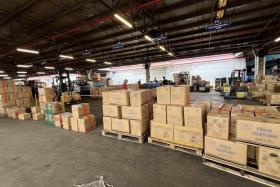NEA found 'extensive rodent droppings' at Beauty World Food Centre
Stallholders at the Beauty World Food Centre have been asked to ensure food is kept in rat-proof containers after checks hinted at the presence of rats in the ceiling and common areas.
They have also been reminded to properly bag their refuse before disposal and keep their stalls clean of food scraps to prevent easy access to food by rats, said the Singapore Food Agency (SFA) and National Environment Agency (NEA) in a joint statement on Feb 1.
The two agencies added that NEA will take enforcement action once it confirms there is a rat infestation at the food centre.
The authorities added that “the building management and managing agent of the food centre have been advised to enhance their pest control measures based on the findings”.
The building management, in a letter to stall operators on Jan 23, said NEA found “extensive rodent droppings” throughout the premises.
The letter, which was made public in a report on citizen journalism website Stomp, said NEA carried out inspections at the food centre on Jan 23 after getting a complaint about a rodent infestation.
It added that the droppings posed a serious hygiene risk, especially since food is served at the hawker centre, which is located on the fourth floor of Beauty World Centre.
The authorities, in the joint statement, said early checks found signs of “rat harbourage” in the ceiling and the common areas of Beauty World Food Centre.
Rat harbourage refers to conditions that provide shelter, food or protection for rats, allowing the rodents to multiply and thrive.
The three most common rat species in Singapore are the Norway rat, roof rat and house mouse.
Infestations of roof rats and house mice that nest indoors are typically the result of inadequate waste management, poor housekeeping practices or the presence of gaps and openings in walls due to wear and tear.
House mice are prolific breeders, which means that their numbers can explode from just two to two million within 24 months in an environment free of predators and human intervention.
Owners of premises who fail to properly manage their refuse or have been found to create conditions favourable to harbouring or propagating of rats can run afoul of public health rules, and face a fine of up to $20,000 or up to three months’ jail, or both, if it is a first offence.
Get The New Paper on your phone with the free TNP app. Download from the Apple App Store or Google Play Store now


